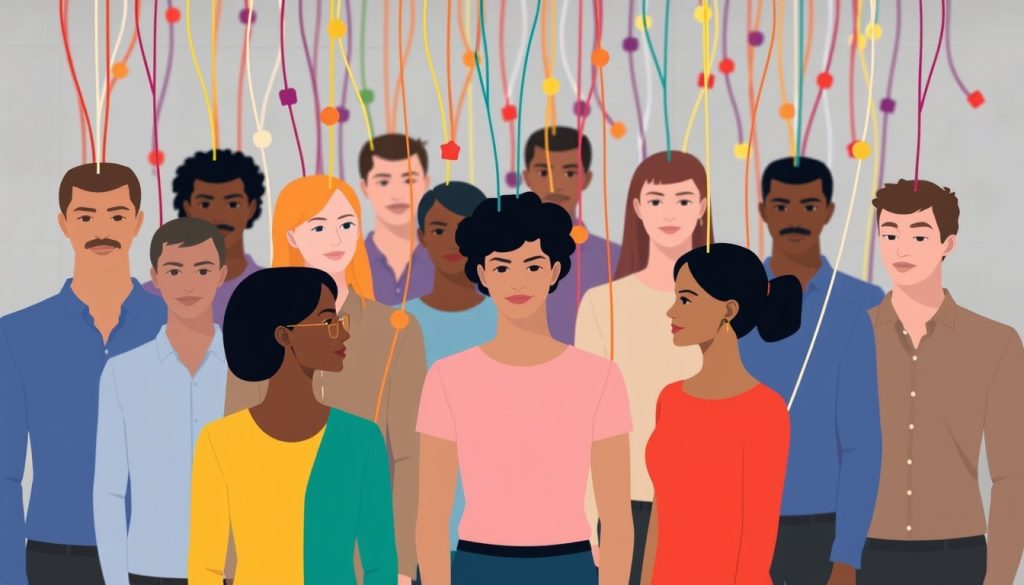The Intricate Web of Human Connections: Exploring Relationships and Interpersonal Psychology

Relationships form the detailed threads that weave our lives together in the fabric of human existence. From birth, we begin forming connections with others, shaping our understanding of the world and ourselves. The field of interpersonal psychology examines these connections, exploring the intricate dynamics that govern our interactions with others. This blog post will guide you through the fascinating area of relationships and interpersonal psychology, illuminating the various factors that influence our connections with others.
The Power of Touch: Affective Communication in Relationships
One of the most fundamental aspects of human relationships is physical touch. Beyond a simple sensory experience, touch is a powerful form of nonverbal communication, conveying emotions and strengthening bonds between individuals. Recent research has provided information on the prevalence and importance of affective touch in close relationships across different cultures.
Sorokowska et al. (2021) found that “Affective touch was most prevalent in relationships with partners and children, and its diversity was relatively higher in warmer, less conservative, and religious countries, and among younger, female, and liberal people.”[1] This finding highlights the cultural and demographic factors influencing how we express affection through touch.
The importance of touch in relationships extends beyond mere cultural norms. It plays a key role in our emotional well-being and can even impact our physical health. Research has shown that interpersonal touch can buffer pain sensitivity in romantic relationships, though it may heighten sensitivity between strangers and friends[2].

Emotion Regulation: The Social Dimension
While we often think of emotions as internal experiences, our emotional lives are deeply intertwined with our social connections. Interpersonal emotion regulation (IER) explores how we use our relationships to manage our emotional states.
As Williams et al. (2018) note, “People often recruit social resources to manage their emotions, a phenomenon known as interpersonal emotion regulation (IER).”[3] This process goes both ways – we seek emotional support from others and provide it, creating a complex web of emotional interdependence in our relationships.
IER has significant implications for our overall well-being and the quality of our relationships. Understanding and using these interpersonal emotional processes can foster stronger, more supportive connections with others.
The Face of Trust: How Appearance Shapes Relationships
In interpersonal psychology, first impressions matter – and often, these impressions are based on facial cues. Facial trustworthiness plays an important role in developing both epistemic trust (trust in others’ knowledge) and interpersonal trust.
Milesi et al. (2023) propose that “positive experiences of caregiving promote IT development that includes a specific sense of trust toward others’ knowledge. Moreover, we suggest that the early ability to infer a judgment of trustworthiness from facial cues is the starting point for developing both IT and ET.”[4]
This hypothesis underscores the importance of early experiences in shaping our ability to trust others and highlights the role of nonverbal cues in forming and maintaining relationships. Understanding these processes can help us navigate social interactions more effectively and build stronger, more trusting relationships.

Gratitude: A Double-Edged Sword in Relationships
Gratitude is often touted as a universally positive force in relationships. Yet, recent research suggests that the effects of gratitude on relationship satisfaction may be more nuanced than previously thought.
Leong et al. (2020) found that “Couples’ grateful mood increased at Time 3, indicating the effectiveness of both interventions. Still, the resulting changes in marital satisfaction differed for the beneficiaries (enactors) and benefactors (targets), such that husbands who perceived their wife’s expressed gratitude as less sincere declined in their marital satisfaction.”[5]
This finding highlights the importance of authenticity in expressing gratitude within relationships. It’s not enough to simply say “thank you” – the perceived sincerity of the expression plays a key role in how it impacts relationship satisfaction.
Power Dynamics and Trust: The Balancing Act
Power imbalances are common in many relationships, from personal to professional contexts. These imbalances can significantly impact the level of trust between individuals.
Du Plessis et al. (2022) propose that “both individuals in an unequal-power dyad trust each other less than individuals in an equal-power dyad because unequal-power dyads heighten the perception of a conflict of interest.”[6] This insight highlights the complex interplay between power and trust in relationships.
Understanding these dynamics can help individuals navigate power imbalances more effectively, fostering trust even when power is not equally distributed. It also underscores the importance of striving for equality in relationships to maximize trust and mutual understanding.
The Communal Approach to Sexuality in Relationships
Sexuality is an integral part of many romantic relationships, but maintaining desire and satisfaction over time can be challenging. A new approach to addressing this challenge involves applying theories of communal motivation to the domain of sexuality.
Research suggests that “One new approach to understanding how couples might maintain desire and satisfaction over the course of time in their relationships involves applying theories of communal motivation to the domain of sexuality.”[7] This perspective emphasizes the importance of mutual care and concern in sexual relationships, moving beyond individual desires to focus on the shared experience of intimacy.
By adopting a communal approach to sexuality, couples might be able to maintain higher levels of satisfaction and desire over the long term, strengthening their overall relationship in the process.

Physiological Synchrony: The Biology of Bonding
While much of interpersonal psychology focuses on behavioral and emotional aspects of relationships, there’s also a fascinating biological dimension to human connections. Research has revealed that people in close relationships can experience physiological synchrony – a phenomenon where their bodily processes become interconnected.
Palumbo et al. (2017) report that “Findings from this field of study indicate that physiological activity between two or more people can become associated or interdependent, often referred to as physiological synchrony. Physiological synchrony has been found in both new and established relationships across a range of contexts, and it correlates with a number of psychosocial constructs.”[8]
This synchrony can manifest in various ways, from aligned heart rates to synchronized cortisol levels. It’s a powerful reminder of our social connections’ deep, biological roots and the profound impact our relationships can have on our physical well-being.
Conclusion: The Ongoing Journey of Understanding Relationships
As we’ve explored in this blog post, the field of interpersonal psychology offers rich information about the complex world of human relationships. From the power of touch to the nuances of gratitude, from the face of trust to the biology of bonding, our connections with others are shaped by many factors.
Understanding these dynamics can help us navigate our relationships more effectively, fostering deeper connections and greater well-being. Yet, it’s important to remember that the study of relationships is an ongoing journey. As we continue to unravel the mysteries of human interaction, new questions and insights will undoubtedly emerge.
By staying curious about our connections with others and open to new understanding, we can continue to grow and thrive in our relationships, enriching our lives and the lives of those around us.

Resources
Palumbo RV, Marraccini ME, Weyandt LL, et al. Interpersonal Autonomic Physiology: A Systematic Review of the Literature. Personality and Social Psychology Review. 2017;21(2):99-141. Link
Sorokowska A, Saluja S, Sorokowski P, et al. Affective Interpersonal Touch in Close Relationships: A Cross-Cultural Perspective. Personality and Social Psychology Bulletin. 2021;47(12):1705-1721. Link
Floyd K, Ray CD, van Raalte LJ, Stein JB, Generous MA. Interpersonal Touch Buffers Pain Sensitivity in Romantic Relationships but Heightens Sensitivity between Strangers and Friends. Research in Psychology and Behavioral Sciences. 2018;6(2):27-34. Link
Williams WC, Morelli SA, Ong DC, Zaki J. Interpersonal emotion regulation: Implications for affiliation, perceived support, relationships, and well-being. Journal of Personality and Social Psychology. 2018;115(2):224-254. Link
Milesi A, De Carli P, Locati F, et al. How Can I Trust You? The Role of Facial Trustworthiness in the Development of Epistemic and Interpersonal Trust. Human Development. 2023;67(1):57-68. Link
Leong JLT, Chen SX, Fung HH, et al. Is Gratitude Always Beneficial to Interpersonal Relationships? The Interplay of Grateful Disposition, Grateful Mood, and Grateful Expression Among Married Couples. Personality and Social Psychology Bulletin. 2020;46(1):64-78. Link
du Plessis C, Nguyen M, Foulk TA, Schaerer M. Relative power and interpersonal trust. Journal of Personality and Social Psychology. 2022. Link
Muise A, Impett EA. Applying Theories of Communal Motivation to Sexuality. Social and Personality Psychology Compass. 2016;10(8):455-467. Link







